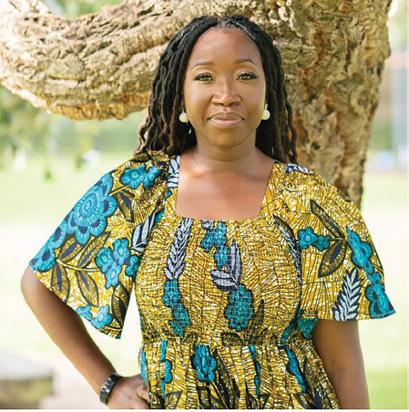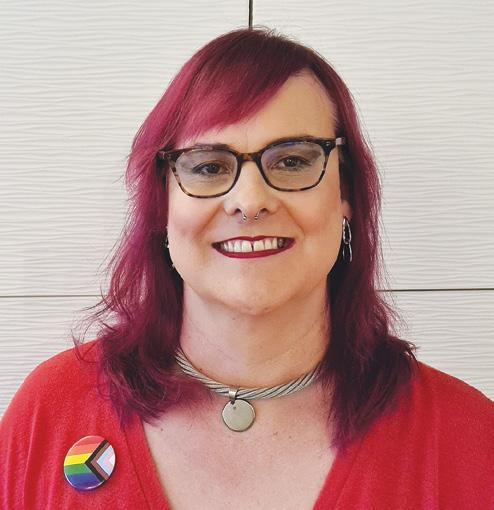
5 minute read
MALE ALLY PPTEU 2022 Award Inspired by NAWIC
Get uncomfortable
Whether you are a person of colour on the receiving end of casual racism, or somebody witnessing it, it’s time for us all to get comfortable being uncomfortable.
Advertisement
Yemi Penn, an Author, Speaker and Thought Leader specialising in diversity, inclusion and trauma, talks about the need to give language to convey the impact and depth of casual racism incidents to help people understand and reflect on their action or inaction. Yemi Penn, Author, Speaker and Thought Leader

“It’s hard and it hurts to do it, but if we don’t find the words, change will be slower to come.”
Actions matter, and we can take courage and instruction from active bystander techniques, which encourage disruptive action from witnesses in the face of discriminatory acts:
⋅Distract: Attempt to diffuse the situation or divert attention by changing the subject or perhaps ‘accidentally’ dropping something. ⋅ Delegate: Escalate the matter to a manager or colleague who might be better-placed or more able to give the feedback than you are. ⋅ Document: If someone else has stepped in and behaviour is escalating, take notes to record the situation. ⋅ Delay: Speak to the victim after the incident and make sure they’re OK. ⋅ Direct: Speak up in the moment to directly intervene by calling out the words or behaviour of the perpetrator. It’s going to feel really uncomfortable. But remember that whatever discomfort you might feel stepping in as an active bystander, the person on the receiving end of the discriminatory behaviours is feeling a lot worse. Taking action demonstrates solidarity. It tells the victim that they are welcome and valued here, and that what’s just happened is not OK.
It won’t take away the harm, but it will provide empathy, action and a kind of closure.
Take care of yourself
According to Women of Colour Australia (WoCA), six out of ten women of colour have experienced discrimination at work, despite the majority (59%) of companies having a diversity policy in place.
If you fall into that 60%, Siti Mustaffa, a Mechanical Engineer and NAWIC ACT committee member, can empathise, and wants you to know that you are not alone.
“Recount the experience to a trusted colleague and tell them how it made you feel. Consider if you feel safe, if you think you will be OK to continue your work, or if you need to step away. If you need their company for a little longer, that’s OK too.”
Remember that it is not your responsibility to educate the perpetrator, nor is it your job to decide what should be done about it if/once you’ve reported it.
But if you think you can, the NAWIC family stands with you as you bravely turn that lived experience into meaningful change.
Siti Mustaffa, Mechanical Engineer and NAWIC ACT committee member
We see you, we care, and we pledge to take action.
Lisa Hogben
AN INTERVIEW WITH ROBYN LOWE
Electrical Trades Teacher, Mentor, NAWIC Member and D&I Advocate
Continual learning is a hallmark of your career. Tell us about your where you began and where you are now.
Started my apprenticeship after year 10 then went on to do industrial electronics. During this time was in the Army reserves and moved up to foreperson then manager of an electrical company. Later changing to IT from my programming experience with PLCs. I trained as a Web Application Programmer, then moved up to IT manager, eventually running my own IT company doing bespoke Web Applications. Got back into the electrical trade after my children finished school as a Project Manager on electrical industrial/commercial sites, and now teaching electrical apprentices & the Electrical Contracting Certificate.

I have a broad spectrum of skills that are a perfect fit for my current role as VET Lecturer and Workplace Assessor – Electrotechnology.
I am continuing my journey as a student doing a Bachelor of Adult and Vocational Education, wanting to improve my delivery and design skills for students.
You identify as a Transgender Woman and chose to be an advocate for empowerment and change in the construction industry. Tell us about this.
Yes, I am a Transgender Woman and an educator in Electrical trades. I recognise who I am and how I present to society. In my life, there is love and acceptance, tolerance and indifference and scorn.
As an educator and a tradesperson, I feel I must be active in the Electrical and the broader community. For the current and next generations, I chose to be visible, to be present. I advocate for those who choose to express their true self or who are questioning themselves.
At the heart of the construction industry there is continual change. Change can happen, it’s one of life’s few constants. In the construction industry we understand and adapt to change easily. Yet when it comes to social change and maybe our personal growth, why do we resist so much? Our brains get comfortable in routine, comfortable in recognisable patterns which become our daily norms. But we filter out and ignore what we think is not relevant to our personal narrative.
So how can we teach ourselves to readily accept the value of individuality that is different to the social construct? What have you observed in your lived experience that can help us as an industry create change and see more acceptance?
I have had the personal experiences where individual’s social construct has been aimed at me. Seasoned trade professionals, whose job includes constant change, have said they’re too old to change or understand me. Learning and adapting is a personal choice. Saying no is just de-prioritising and devaluing that person to accommodate your internal narrative.
Many argue “If you haven’t learnt something new today, you’re not trying”.
The first step is accepting there is a societal problem.
Step two is we need to stop ignoring it. This is the hard one it takes strength to call someone out and go against the herd, you may become a target as well. However when speaking up becomes the norm, acceptance and diversity will become the norm too.










